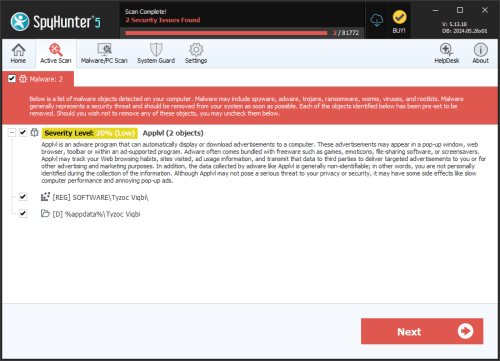Mal/Phish-A
Threat Scorecard
EnigmaSoft Threat Scorecard
EnigmaSoft Threat Scorecards are assessment reports for different malware threats which have been collected and analyzed by our research team. EnigmaSoft Threat Scorecards evaluate and rank threats using several metrics including real-world and potential risk factors, trends, frequency, prevalence, and persistence. EnigmaSoft Threat Scorecards are updated regularly based on our research data and metrics and are useful for a wide range of computer users, from end users seeking solutions to remove malware from their systems to security experts analyzing threats.
EnigmaSoft Threat Scorecards display a variety of useful information, including:
Ranking: The ranking of a particular threat in EnigmaSoft’s Threat Database.
Severity Level: The determined severity level of an object, represented numerically, based on our risk modeling process and research, as explained in our Threat Assessment Criteria.
Infected Computers: The number of confirmed and suspected cases of a particular threat detected on infected computers as reported by SpyHunter.
See also Threat Assessment Criteria.
| Threat Level: | 80 % (High) |
| Infected Computers: | 5 |
| First Seen: | November 7, 2011 |
| Last Seen: | November 19, 2021 |
| OS(es) Affected: | Windows |
Computer users may have received an email claiming to come from PayPal, urging the recipient to protect their PayPal account's information. Despite its urgent language, ESG PC security researchers have found that this email that is circulating is part of a dangerous phishing scam and designed to obtain your personal data, is classified as Mal/Phish-A. The email involved in this phishing scam was first detected in late October and early November of 2011. It claims that unusual credit card charges were linked to the victim's PayPal account, claiming to come from the PayPal review team.
Phishing scams have been around for a long time, and people still fall for them. Of course, one should also recognize that, as Mal/Phish-A attests, criminals have gotten better at imitating legitimate emails from important companies, making their phishing scams more effective. Some security applications detect this phishing scam as Mal/Phish-A. However, ESG PC security researchers consider that the best way to avoid phishing scams such as Mal/Phish-A is to become educated and to follow your instincts when receiving an email from an unknown source. Simply knowing the existence of phishing scams such as Mal/Phish-A can do wonders for reducing the rate at which people become duped by these kinds of scams. Research has shown that about five percent of the population still falls for phishing scams such as Mal/Phish-A. While this number may not seem incredibly high, it is important to note the huge number of people online. Five percent of computer users are a huge amount of potential victims.
The first alarm that should be triggered from the Mal/Phish-A scam is the fact that this fake email from PayPal claims that you need to download an attached form. Downloading attached files in unsolicited emails is an extremely dubious practice that will almost invariably lead to a malware infection. The attached file to the Mal/Phish-A scam email leads the victim to a web page, which is a fairly good imitation of a legitimate PayPal page. However, there are a couple of mistakes in the Mal/Phish-A scam that can help you make sure that you do not fall for the Mal/Phish-A scam.
- The sender's email address is not associated with PayPal. The fact that Mal/Phish-A says 'from: PayPal' is not any indication that the email really comes from this online money transfer service.
- The domain name associated with Mal/Phish-A is pp-redacted-.com. Taking a minute to look up this address reveals that it has nothing to do with PayPal.


Submit Comment
Please DO NOT use this comment system for support or billing questions. For SpyHunter technical support requests, please contact our technical support team directly by opening a customer support ticket via your SpyHunter. For billing issues, please refer to our "Billing Questions or Problems?" page. For general inquiries (complaints, legal, press, marketing, copyright), visit our "Inquiries and Feedback" page.